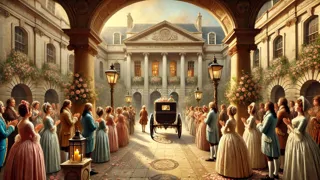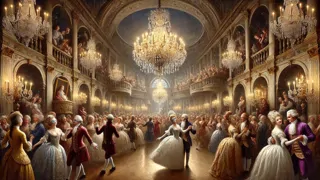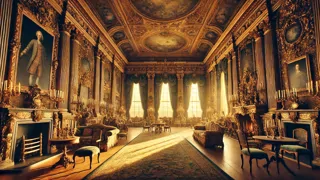Introduction
Under a pale autumn sky, the grand façade of Mayfair House gleamed like a polished gem, promising elegance and prosperity to all who passed its wrought-iron gates. Inside, the corridors echoed with the rustle of silks and the low laughter of visiting dignitaries, each determined to witness the celebrated union of Lord Edmund Blackwood and Lady Isabella Harrington. Gold-framed portraits surveyed the activity with silent approval, and tapestries depicting pastoral idylls seemed almost to sway in time with the flicker of countless candelabras. Word had spread through London’s whispers and gossip columns that this marriage united two of the greatest fortunes in the realm—both eager to elevate their standing among the elite. Yet behind the courteous bows and measured compliments, neither bride nor groom found warmth in the other’s eyes. Isabella, whose reputation for beauty and wit had preceded her, smiled with graceful restraint, while Edmund maintained a polite reserve that bordered on indifference. Every detail of their courtship—the lavish balls, the poetic verses exchanged, the extravagant gifts—had been orchestrated by ambitious elders intent on securing titles and social favor. Now, as they prepared to enter the ceremony chamber lined with white lilies and mirrored panels, a subtle tension drifted through the air, as though the mansion itself hesitated to celebrate a union destined to test the limits of style over substance. In that anxious hush, lace sleeves traced the edges of embroidered kneeling cushions, and the hush of expectation fell heavy on gilded pews. Yet neither heart stirred beyond polite agreement, and as the organist raised his hands, the first chord resonated through stone walls, marking the beginning of a dazzling pageant in which true affection remained conspicuously absent.
The Gilded Ceremony
The morning of the nuptials arrived with crisp clarity, and Mayfair House prepared for its grand procession. Carriages draped in pastel silks bearing the new Lord and Lady Blackwood rolled through the courtyard under a canopy of cheering peers, their hoop skirts and embroidered coats glinting in the soft dawn light. Crystalline harps sounded from the gallery, weaving a melody that wound through vaulted archways and across marble floors flecked with scattered rose petals. Outside, a contingent of well-wishers lined the street, their polite applause and glowing smiles disguised the murmurs of curiosity about the state of the couple’s true feelings. Inside the chapel, petals underfoot and lilies arching toward vaulted ceilings offered a scene both resplendent and surreal. Isabella’s gown, layered in pale silk and trimmed with real pearls, caught the morning sun through stained glass, scattering flecks of color across polished pews. Edmund, clad in midnight-blue velvet, watched without expression as she approached, each step measured, each breath reserved. Their vows, spoken in voices steady but hollow, wove a seamless tapestry of promise—promise of loyalty, promise of fortune, promise of unity—yet offered scant inkling of genuine warmth. As the final “I do” echoed, the assembly rose in a measured applause that felt more ritual than celebration. Crystal flutes lifted in toasts to health and prosperity, though the whispered gossip in hidden corners traded less on affection and more on dowry details and rumored estates. Across silver platters, guests sampled sugared confections shaped like gilded crowns, while flutes of delicate champagne sparkled with whispered hopes that the marriage might bloom beyond its ornamental façade. In every gesture, the ceremony spoke louder of ambition than of ardor, and though the Blackwoods departed under a veil of applause, a subtle chill trailed behind them, as if the mansion itself questioned whether appearances alone could sustain a life together.

Beyond the rose-laden chapel, a hush fell over the inner gardens where servants paused from their duties to witness the passing bride and groom. Lady Isabella, adjusting a strand of hair pinned by a diamond clasp, glanced at Edmund’s profile—handsome in the strictest sense, but unmoved by joy. Edmund, catching her eye for a fleeting moment, offered her a curt nod, his expression composed yet distant. No tender touch crossed between them; affection remained a subtle phantom slipping through the lace and silk of public display. Lord Harrington and Lady Blackwood Sr. stood to the side, their faces beaming with triumph, as if the marriage secured the final piece in a lifelong puzzle of social ascendancy. Nearby, younger cousins exchanged anticipatory whispers about future fêtes and rumored diamonds, oblivious to the quiet tension at the union’s core. It was a pageant orchestrated to perfection, but even the most lavish spectacle could not entirely conceal the unspoken question: had two proud families merely traded titles, or had they overlooked the fragile heart at the center of their design? The garden gates smiled softly with ornate scrollwork, offering passage into a world where loveless grandeur might flourish for seasons to come—or unravel at the first sign of true scrutiny.
Society’s Spectacle
Over the following weeks, London’s elite clamored to honor the Blackwoods with sumptuous entertainments and exclusive balls. Gaslit streets glowed with gossip, and every invitation to Mayfair House became a coveted symbol of insider status. Inside the mansion’s grand ballroom, crystal chandeliers cast prismatic light across thronging dancers whose lace and velvet formed a swirling tapestry of color. Courtiers in dazzling wigs vied for Lady Isabella’s attention, eager to compliment the diamond choker rumored to have cost half a year’s income for an average gentleman. Gentlemen approached Edmund with deference, praising his taste in patronage and his judicious management of family estates. Yet whenever Isabella offered a brittle laugh or Edmund returned a polite nod, neither sentiment reached beyond perfunctory form.

At a masked masquerade thrown in their honor, Isabella glided through swirling crowds like a painted statuette, her silver mask obscuring all but polished cheekbones. Edmund watched from a raised gallery, sipping a brooding glass of port and noting the fickle flattery of acquaintances whose eyes betrayed half-hearted sincerity. Beneath the veneer of joy, he felt the first tremor of regret—regret not for the wealth but for the emptiness that tickled his spine when compliments traded places with companionship. Isabella, meanwhile, found solace only in her own reflection, studying each gesture in grand mirrors hung strategically to magnify her grace. Conversations drifted from household rumors to stock tips to whispered speculations about who might supplant Lord Blackwood at the next season.
Each event arrived cloaked in the promise of pleasure but left Isabella more exhausted and Edmund more remote. The statuary in the conservatory seemed to mock them—marble figures forever frozen in polite embrace—while candles guttered in their vigilant sconces as if struggling to sustain a flame of genuine warmth. Servants exchanged furtive glances in corners where music softened, noting the absence of laughter that sprang from the heart rather than from courtesy. In private moments, Isabella brushed aside silk folds and confronted the hush that now draped their bedchamber like a heavy curtain. Edmund, staring through curtained windows at city lights far below, wondered how many more speeches and fanfare he could endure before the gilded cage of marriage became too suffocating to bear. Yet neither dared to speak the truth, for social survival demanded unwavering composure, and to acknowledge unhappiness would be to relinquish the very power they had secured with titles and trousseaus. Thus their lives turned to a polished performance—each smile, each bow, each word measured for maximum effect—while genuine feeling lingered on the edge of remorseful memory, just out of reach.
Fractures in the Facade
As winter crept into London, the Blackwood household felt the chill not only of crisp air but of an invisible rift widening between husband and wife. At dawn, servants noted Lord Blackwood’s empty dressing room, his faint silhouette seen only through slender gaps in drawn drapes. In turn, Lady Isabella wandered the galleries in search of meaning behind the artful silences that now defined their days. Books lay unopened on side tables; half-empty teacups cooled beside unopened letters. A hush of regret drifted through corridors once alive with polite laughter.

One evening, after a dinner of gilded pâtés and candied fruits, Isabella ventured a tentative conversation about memories of happier days, proposing a simple stroll in the estate’s walled garden. Edmund met her request with frigid courtesy, insisting on dispatching a servant to fetch cloaks and gloves. Their walk, planned as a gesture of reconciliation, proceeded in stilted silence beneath barren branches dusted with frost. When Isabella finally spoke—her voice so soft Edmund nearly missed her words—she asked if he remembered their first meeting at that very spot, before fortunes were weighed in pounds and titles. For a heartbeat, Edmund paused, recalling laughter in a candlelit library, hands brushing lightly across competing tomes of poetry. Then the weight of their obligations settled back onto his shoulders, and he turned away.
In that moment, the fragile illusion shattered—a mirror dropped from great height, crashing into irreparable fragments. Isabella, her cheeks flushed by cold and hurt, retreated into the velvet shadows of the pergola, tears springing unbidden. Edmund, realizing the depth of her sorrow, felt an ache that neither compliment nor coin could assuage. He knelt beside her, but the distance between them was no longer measured in steps but in the gulf of unspoken longing. Words hovered at the edge of possibility—apology, confession, hope—but pride sealed their lips. They parted at the garden gate under a pale moon, each bearing the weight of regret and the recognition that no amount of finery could conceal a heart grown cold. So they returned to Mayfair House through archways carved with angelic stonework that seemed suddenly mocking in its eternal contentment. And in the silence that followed, both understood that even the most exquisite facade would crack if not held together by something deeper than style.
Conclusion
In the charged stillness of a winter dawn, Lord Blackwood and Lady Isabella found themselves alone in the grand hall once reserved for society’s proudest gatherings. The rich tapestries hung silently overhead, and the candelabras cast soft halos on the polished floor, as if offering one last chance at reconciliation. They met at the center of the room, gazes drawn together by a shared realization: the currency of admiration and opulence could not purchase what both had secretly yearned for all along—an unguarded moment of honest affection. Words were unnecessary; in the quiet exchange of glances, they acknowledged the gulf that circumstance and pride had carved between them. Yet behind that recognition lay a spark—fragile but undeniable—that neither silk nor silver could claim. With unhurried grace, Edmund reached for Isabella’s hand, brushing away a stray lock that had slipped free from her coiffure. Isabella returned his touch with a tentative warmth, the first genuine gesture since vows had echoed through marble arches weeks before. In that hushed embrace, they discovered the slender thread still binding them—a hope that, if nurtured beyond society’s pretense, might transform their gilded partnership into something more enduring. As dawn’s pale light filtered through bay windows, they turned toward each other and toward the uncertain promise of a marriage redefined by sincerity rather than status. And for the first time, Mayfair House bore witness not only to grandeur, but to a fragile, budding hope that even the most fashionable union might find redemption through honesty and shared resolve.

















